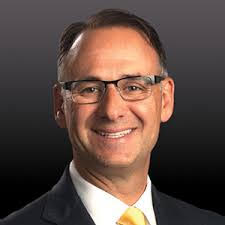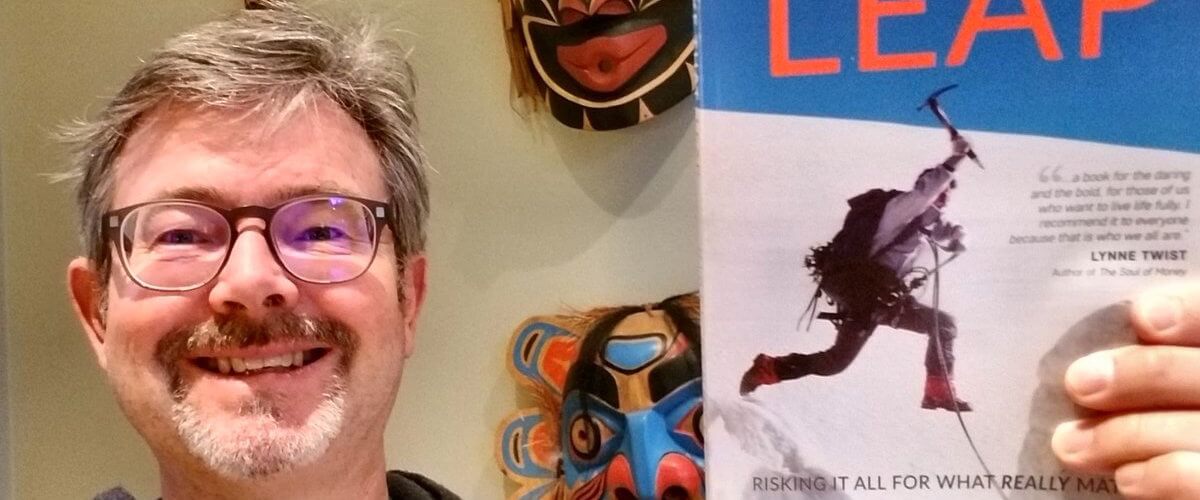1001 Leadership Challenges
“Life is either a daring adventure, or nothing at all.” - Helen Keller
I recently had a conversation with someone about how the world is changing so much; and how, in the place I live – Vancouver, BC – the real estate prices are such that a family with double the average household income can no longer afford a single, family home – even in the suburbs.
My friend’s comment was that if they knew then, what they knew now, they may not have chosen to have kids because they’re concerned about how much those kids will struggle.
Opposite Thinking
As I heard the comment, I was thinking almost the opposite: that this is a great time to be alive, and there are many great opportunities – if you are up for the challenge, willing to do the work, and to stretch your capabilities. Although things may be more expensive and more challenging – as in many cities around the world - the point is that you are either in one camp, or the other. I’m in the ‘it forces you to get stronger’ camp, and he’s in the ‘it slowly destroys you’ camp.
A lot of this links back to Keep Going for It (Chapter 16) in my book Your Oxygen Mask First. If you keep learning, growing and stretching, the next leadership challenges that comes along are no big deal.
By default, I’m wired to think that almost anything is totally doable – and that challenges are kind of fun. You can come across an obstacle and learn through it.
I’ve been exploring getting my pilot’s and helicopter pilot’s license – both incredibly hard to do. While I’m not sure I can find the time, I’m intrigued with the challenge – and I know I can do either, if I set my mind to it.
“The hard truth about leadership? It either forces you to get stronger, or slowly destroys you.”
On reflection, that quote is a great summary of everything I’ve learned about leadership over the past twenty plus years. Leadership - whether in business or the attempt to be great at anything - is an incredible catalyst for your own growth and development as a person. I’ve seen that, no matter what the challenge, if you commit to learn and grow through it, you can do anything. I probably have thousands of examples of people who have done so.
Because the truth is, if you want to be one of the snake charmers in India who catches and works with cobras, you need to be darn good – or you’re dead. The same thing holds true of a leader in a growing organization.
(BTW, I was thrilled to hear that well-known supermodel/author/entrepreneur Kathy Ireland shared that quote from my book on Twitter, a few weeks ago.)
Old Habits Die Hard
If you’re still going with old skill sets, chances are you also have outdated ways of thinking. It just isn’t the same as when our parents grew up, when they were buying a house. But if you continue to come from that place, to use that as a comparison for success, you’ll continue to be limited.
For those who embrace leadership challenges, who continually learn and improve skills sets and operating systems, it is a wonderful rewarding journey that forces you to learn and grow – and to thrive.
The biggest gift of all is that you get increasingly confident and capable.
Once you have conquered 1000 notable, different challenges, 1001 is nothing.
Speak Volumes
Straight-talking, passionate and energetic, Kevin is known for his invigorating presentations, packed with practical knowledge for leadership and life – and a lot of laughs.
Click here to find out more about inviting Kevin to speak at your next event. Your audience will love him!
Time for a Personal Review of Your Performance
“Plans are nothing; planning is everything” - Dwight D. Eisenhower
Congratulations! You made it through the 1st quarter of 2018 – and, if your experience is anything like mine, it went by in a flash.
Hopefully you are having a spectacular year, so far, and have achieved everything you wanted to – at work, in your life, and for yourself.
Personal Review
One of the most powerful habits of the most successful leaders I work with, is their ability to look into the mirror, to self-reflect, and to figure out how to ensure they become an even better version of themselves – tomorrow, next week, next month and next year.
The end of the Quarter is the perfect time to practice this habit.
In my new book Your Oxygen Mask First - Chapter 17 Plan, Plan and Plan Again - are two main tools:
- The Master Plan (which is the reflection and resetting of your goals on an annual basis) and
- The Quarterly Reset (which enables you to do the same every 90 days.)
For a quick refresher of the worksheet terminology please check out this Master Plan post.
Andrew Limouris: Entrepreneur of the Year
In 2017 two of my US clients received EY (Ernst & Young Inc.) Entrepreneur of the Year ® awards. Andrew Limouris (President & CEO of Medix) and Brent Parent (Founder & CEO of Material Handling Services, LLC) were each recognized for excelling in innovation, financial performance and personal commitment to their businesses and communities.
As their coach, I could not have been prouder.
 I had a chance to talk to these extraordinary leaders recently, about what it takes to stay strong and resilient, through extraordinary growth – and for the long haul.
I had a chance to talk to these extraordinary leaders recently, about what it takes to stay strong and resilient, through extraordinary growth – and for the long haul.
Here is an excerpt of my conversation with Andrew Limouris, who was awarded the Midwest Entrepreneur of The Year ® 2017 in Technology and Talent Services.
Congratulations on your award! You were so emotional in your acceptance speech - why were you so moved?
I was thinking about my mom - who died 10 months after I started my company - and how much she would have liked to be there. She gave me her blessing, helped me move into my first office, and told me that if I work hard, everything would be OK.
My wife and kids were there. They were so patient with me, especially during the first 10 years when my kids were growing up. I was in a lot of pictures, coaching some sports, and things like that, but not always mentally there. I was extremely focused on the business.
And my brother was there. He was jumping up and down with excitement.
There was a lot of emotion, and validation for this idea of a double bottom line - people, profit, and planet - that I talk about in my book, Won with Purpose, and knowing that we are living it here at Medix. You have to be able to have purpose in everything you do - and to tie any success, any humility, to where a person pays homage to something greater than themselves.
Let’s talk about leadership – the upside and the downside. If you were to talk to your 25-year old self - or to someone at the beginning of an entrepreneurial life - what would you say were some of the lessons you’ve learned?
There’s a lot that goes into building a company. It becomes part of your life in a way that intertwines all your family stuff, your social life – it becomes who you are.
Your network is so important to your growth.
I would say to parents of kids five to 18: put your child in a situation where they are working in teams, with all kinds of personalities and people. I don’t care if it’s choir, dance, jazz…hockey, football, basketball or baseball.
One of the strengths that’s really helped me, as an entrepreneur, is that I’ve worked with so many types of people, and know who I can surround myself with, to create something great.
When you know you’re in a circle of people who are not bringing out the best in you - who are intentional and meaningful, and who help you create the best version of yourself - run away fast.
My kids hate when I say, “You make good choices, good things happen. You make bad choices, bad things happen.” But it’s really that simple…
You once said you paid a price for growing your company. What do you do to stay healthy and resilient, for the long haul?
I have a thousand different voices in my head: about priorities, metrics and KPIs. Are my people hitting this? This area of the company isn’t humming right now. I wonder how this person is doing: his father died, and are we showing up for him? And so-and-so’s pregnant, and we have to create a great environment so that women can come back to work here, and rave about it.
The amount of anxiety and pressure around every single aspect of finding data, HR, marketing, legal, every office, every division, every leader. If you’re really all in, you’re all in. Whether or not you are responsible, day to day, you are vulnerable. You are accountable.
You say in your book Your Oxygen Mask First, that you give everything at work, and your family gets the scraps, at the end of the night. If I were to be 100% vulnerable, I would say there’s an element of that that’s never changed.
There’s no such thing as work-life balance - it’s part of the territory - but I make an effort, within the 168 hours (a week) I have.
The people I work with are my brothers and sisters: I love them. And I love my family. There’s this blurred vision of who and what comes first, a lot of the time. So, it has been very difficult, but one of the best things that happened is I found someone to support me, who helps me to be accountable to what’s important.
I have three kids – Lidia 10, Eli 23, Denin 15 – and Eli is the most vocal about me being on my phone, and not paying attention. My wife, too. My son says, “You’re the boss, I don’t understand why you even have to go.” I love him!
When you go on vacation you have to climb down the mountain. It takes 24 to 48 hours before you get to a place where you are kind of on vacation. My wife thinks I’m awesome, at that point!
I hear how much you care, and the relentlessness of that. Do you have rituals or habits to take care of yourself?
I surround myself with people who give me what I need.
I was lucky to marry someone who absolutely lets me know my blind spots. She gives me kisses and hugs when I need them, but never, ever lets me slide. I’m so open and vulnerable with her.
Nothing beats a long shower!
And I spend time reflecting:
What did I do with my time today? What will I do with my time tomorrow?
What are the one of two things that make me tick? Why do I do what I do?
I want to positively impact lives by creating opportunity. What am I doing to make that happen? To make my company better?
I work out with someone – a friend or a trainer. You start to talk about things – it may be simple things - that helps you to sort things out.
Don’t forget: stress is good, but only if you have people in your life – people you can depend on and count on. It’s only bad if you’re in it alone. With my network of people, I’m never alone in any decision I make. I feel so blessed to know who I can depend on, who I can talk to.
Have mentors and a coach – it’s so important.
About Medix
Medix provides workforce solutions to clients, and creates opportunity for talent representing a variety of industries in Healthcare, Scientific and Information Technology. With values in both purpose and profit, Medix engages in social responsibility in several ways, including donations to a summer camp for children who lost a parent through service to their country; engagement with an orphanage in Sierra Leone, and mentoring older orphans to develop work skills they need to provide for themselves, one day.
Medix has been featured on such prestigious lists as Inc. Magazine’s “Inc. 5000 Honor Roll” (six consecutive years on list of the nation’s fastest growing private companies), and Best and Brightest Companies to Work for in the Nation. www.medixteam.com.
Taking the Leap for What Really Matters
Nigel Bennett - a client of mine who has become a great friend – has finally released Take That Leap: Risking It All for What Really Matters, a book about the amazing adventures of his life, as an entrepreneur and extreme outdoor adventurer.
Nigel is one of the few entrepreneurs I know who has attained the ultimate in achievement and enjoyment (in fact, I featured him in the first chapter of my book Your Oxygen Mask First). And he fought hard, step by step, to create a spectacular life of freedom that most people only dream about.
When I first met Nigel, he was being pummelled by life, despite a booming business. He was the prime example of someone who didn’t supply his oxygen mask first – and was paying a high price for it.
It quickly became clear that he needed a different mindset – and different tools to handle the intensity of life as a CEO.
Today, he lives every business owner’s fantasy, with lots of free time to spend on personal passions—building homes for people in need, travelling with his family, and creating great experiences everywhere he goes.
Read this book about taking the leap – it’s an amazing, and inspiring read.
Your Customer Service Experience Depends on the Little Things
“Fun is good.” - Dr. Seuss
An experience after a recent boat cruise got me thinking about the little things that make up a consistent experience for your clients – the kind that you want them to have.
After a great time on the water, we walked back from the wharf to a cool, old English pub. The place was buzzing.
We had a ton of fun, as we told stories and laughed, and laughed - apparently a bit too loudly for the waitress. Twice she asked us to be quiet. The second time, she told me to ‘use my inside voice’ because others around us were having dinner. Ouch.
I know I can be loud when I laugh and have fun, but our behaviour wasn’t bad, at all - and not inappropriate for our surroundings. This wasn’t a place of worship or a ballet performance. It was a pub - a really great spot, with excellent food, drink and service. They’d done everything right, but it was clearly a ‘no fun’ zone.
Now, to me, an English pub is a place where the owners want the patrons to have a good time – to share a laugh with a group of friends. So it struck me as silly that it was important to this person that the pub should be quiet.
More than that, instead of making a quiet request, or enrolling us in solving her problem, she put me down.
I don’t know if it was the policy of pub for people not to laugh, volume restrictions, if the waitperson had a headache, or a bad day. As a customer I don’t know, or care.
That customer service experience reminded me that you can do everything right in your business to build customer loyalty, but one little thing – or person - can eliminate it forever.
Next time we’ll go somewhere else.
Stress Scale
"It’s not stress that kills us, it is our reaction to it." - Hans Selye, Austrian-Canadian endocrinologist, pioneered existence of biological stress
One of the most common conversations, in my work with high performing executives + CEOs, is about managing the level of responsibility and stress. Everyone thrives at a different stress scale level, and some stress can bring us to higher levels of performance. But the source – and intensity – also affects us differently. It’s a very fine line between maximum performance, and overloaded meltdown.
There’s a way to measure how much is too much. The Social Readjustment Rating Scale (SRRS) is a list of 43 stressful life events that can contribute to illness - also known as the Holmes and Rahe Stress Scale, after psychiatrists Thomas Holmes and Richard Rahe, who first published the list in 1967.
Stress Scale
"A condition or feeling experienced when a person perceives that demands exceed the personal and social resources the individual is able to mobilize…when we feel that things are out of control". - Richard Lazarus, Behavioural Psychologist
Each life event (in the past year) is given a score, the total of which gives an estimate of how stress can affect health. Score more than 300 and we’re at the highest risk for illness. Under 150, the risk is slight. Predictably, the death of someone close, loss of a job and a move are on the list. Surprisingly, so are vacations. My wife feels the stress, I know, because there’s so much to do to get ready for one.
When we’re absorbed and engaged in managing these things, we don’t take time to notice their effect. But when the smaller things stack up, or a big one hits, the stress becomes destructive rather than constructive. And then we are vulnerable.
Most people can handle higher levels of stress for a week or so. But, stay there too long, and it will impact your health, your sleep, your ability to focus, and your relationships.
And you often can’t tell until it’s too late.
At the very least, you need to make sure you regularly manage the basics: to sleep, exercise and eat well. Beyond that if the stress is too much – for too long – you must find a way to reduce the intensity, and to get back on your feet. That includes seeking professional help.
The Challenge
- Figure out your stress score on the Scale. Click here for the automated version, or manually using the list below.
- If you are in the healthy zone, congratulations
- If you’re not, figure out what you can do to bring it down soon
I’d like to acknowledge Graham Robins, CEO of A&A Customs Broker | Founder at BorderBuddy for sharing this wonderful tool.
Social Readjustment Rating Scale
Add up the number of “Life Change Units” that apply to events that have happened in the past year. The final score will give a rough estimate of how stress affects health.
- Death of a spouse - 100 Life Change Units
- Divorce - 73 Life Change Units
- Marital separation - 65 Life Change Units
- Imprisonment - 63 Life Change Units
- Death of a close family member - 63 Life Change Units
- Personal injury or illness - 53 Life Change Units
- Marriage - 50 Life Change Units
- Dismissal from work - 47 Life Change Units
- Marital reconciliation - 45 Life Change Units
- Retirement - 45 Life Change Units
- Change in health of family member - 44 Life Change Units
- Pregnancy - 40 Life Change Units
- Sexual difficulties -39 Life Change Units
- Gain a new family member - 39 Life Change Units
- Business readjustment - 39 Life Change Units
- Change in financial state - 38 Life Change Units
- Death of a close friend - 37 Life Change Units
- Change to different line of work - 36 Life Change Units
- Change in frequency of arguments - 35 Life Change Units
- Major mortgage - 32 Life Change Units
- Foreclosure of mortgage or loan - 30 Life Change Units
- Change in responsibilities at work - 29 Life Change Units
- Child leaving home - 29 Life Change Units
- Trouble with in-laws - 29 Life Change Units
- Outstanding personal achievement - 28 Life Change Units
- Spouse starts or stops work - 26 Life Change Units
- Beginning or end school - 26 Life Change Units
- Change in living conditions - 25 Life Change Units
- Revision of personal habits - 24 Life Change Units
- Trouble with boss - 23 Life Change Units
- Change in working hours or conditions - 20 Life Change Units
- Change in residence - 20 Life Change Units
- Change in schools - 20 Life Change Units
- Change in recreation - 19 Life Change Units
- Change in church activities - 19 Life Change Units
- Change in social activities - 18 Life Change Units
- Minor mortgage or loan - 17 Life Change Units
- Change in sleeping habits - 16 Life Change Units
- Change in number of family reunions - 15 Life Change Units
- Change in eating habits - 15 Life Change Units
- Vacation - 13 Life Change Units
- Major Holiday - 12 Life Change Units
- Minor violation of law - 11 Life Change Units
Scoring:
- 300+: At risk of illness
- 150-299: Risk of illness is moderate (reduced by 30% from the above risk)
- <150: Only have a slight risk of illness





